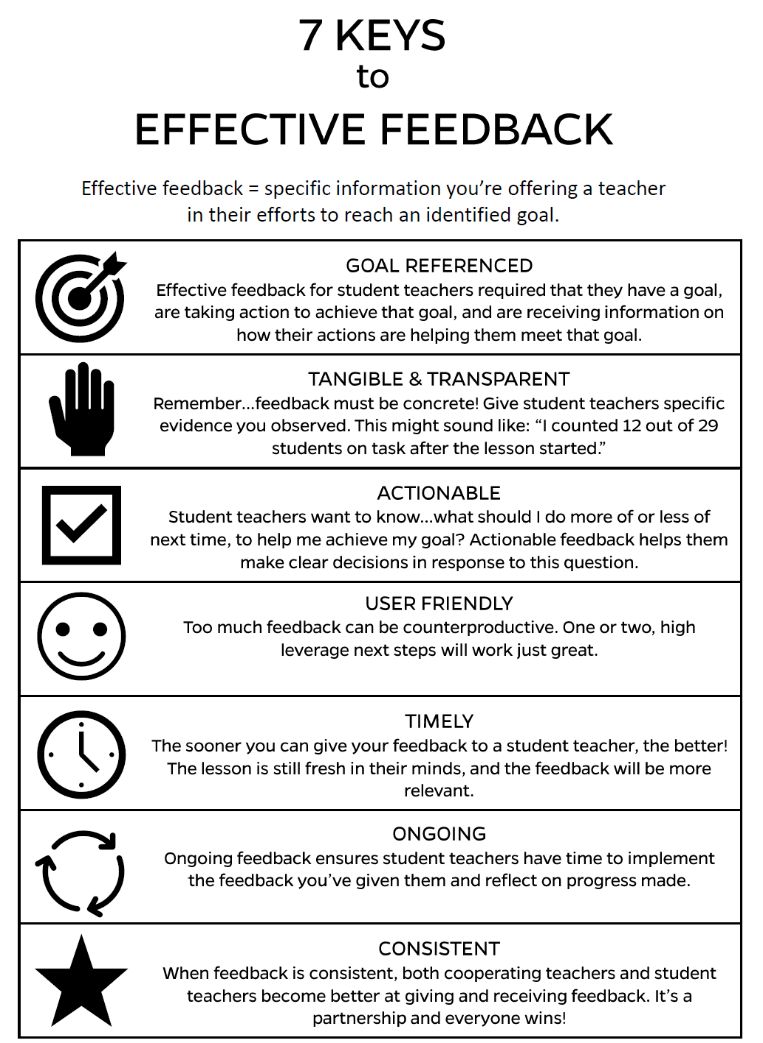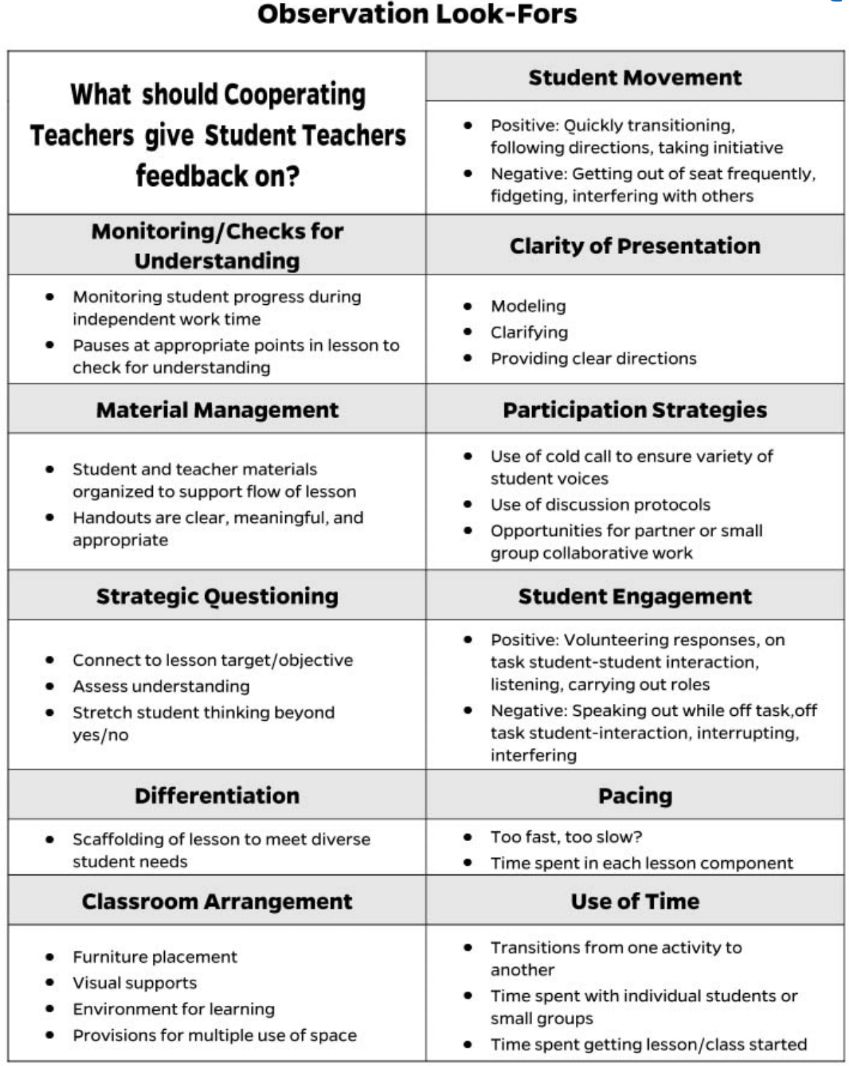Introduction
In this second publication of the Cooperating Teachers’ Best Practices for Mentoring series, the mentorship area focus will be on that of social support. Social support is most often considered the care of the student teacher’s problems (Alemdag & Simsek, 2017; Scandura, 1992). Through this care, cooperating teachers help their student teachers find solutions to their problems that arise during the internship. Most importantly, this area also includes a high level of quality communication between the cooperating teacher and the student teacher. This publication will break down the major areas of social support and provide real-world examples of how to implement them during the internship. This publication also provides an overview of the Best Practices for Mentoring series in Appendix A.
Components of Social Support
- Communicating Regularly
Regular and consistent communication involves the cooperating teacher checking in with the student teacher daily and weekly. The cooperating teacher should be available for face-to-face conversations, as well as accessible for helping the student teacher via phone calls, texts, and/or emails. Some examples of communicating regularly are (1) checking in with the student teacher each morning before classes begin; (2) checking in between classes with the student teacher to see if any problems have arisen; and (3) being available to answer questions the student teacher might have outside normal school hours.
2. Communicating Openly
Communicating openly with the student teacher involves honest and candid discussions. Cooperating teachers should openly discuss all aspects of their job with their student teachers. This includes highlights of their daily responsibilities, as well as the challenges of their role as an agriscience teacher and FFA Advisor. In addition, cooperating teachers should seek to discuss the student teacher’s performance, including positive and constructive feedback. Some examples of communicating openly are (1) discussing a less-than-stellar lesson execution; (2) talking through the improvement of classroom management skills; and (3) openly discussing the challenges that teachers experience in the school environment (i.e., school district policies, parent/teacher conferences, and communicating with administration).
3. Encouraging Efforts and Staying Attuned to Mindset
Encouraging and supporting the student teacher’s effort, as well as staying attuned to their mindset, attitude, and well-being, involves actively listening to the student teacher and being aware of any changes in their frame of mind. The cooperating teacher should be able to identify when their student teacher is having a bad lesson or day and be able to discuss strategies with them on how to work through challenges of their internship and the teaching profession. This component also emphasizes the importance for the cooperating teacher to discuss strategies for finding a work/life balance with the student teacher. Some examples of encouraging efforts and staying attuned to mindset are (1) acknowledging the student teacher’s frustration and offering support on how to manage and work through it; (2) sharing personal challenges with work/life balance with the student teacher and how to work on improving this area; and (3) providing positive feedback, even during challenging times, in order to help the student teacher develop a growth mindset.
4. Weekly Comprehensive Feedback
In addition to conversations throughout the week and in between daily lessons, weekly comprehensive feedback should be provided on performance and progress in an uninterrupted setting (Figure 1). This should occur without other distractions, such as students or other teachers, and be purposively scheduled as one-on-one time. The cooperating teacher should use what has been observed as the basis of the conversation and include opportunities to discuss what went well, as well as potential adjustments to lessons and classroom management (Figure 2). Some examples of weekly comprehensive feedback are (1) determining a set time each week to meet; (2) holding meetings in an area that is private and will not be interrupted by other teachers or students; and (3) utilizing this time to discuss lesson performance using observational notes from previous lessons.

Credit: MsHouser.com

Credit: MsHouser.com
The area of social support that should be provided by cooperating teachers for their student teachers includes the four components of communicating regularly, communicating openly, encouraging efforts and staying attuned to mindset, and the use of weekly comprehensive feedback. When student teachers feel supported in this area, they are more likely to have a positive internship experience and remain in the profession (Edgar et al., 2011; Kasperbauer & Roberts, 2007; Roberts, 2006; Rocca, 2005). For additional information related to social support, check out www.UFCooperatingTeachersSupport.com.
References
Alemdag, E., & Simsek, P. O. (2017). Pre-service teacher’s evaluation of their mentor teachers, school experiences, and theory-practice relationship. International Journal of Progressive Education, 13(2), 165–179. https://ijpe.inased.org/makale_indir/244
Edgar, D. W., Roberts, T. G., & Murphy, T. H. (2011) Exploring relationships between teaching efficacy and student teacher – cooperating teacher relationships. Journal of Agricultural Education, 52(1), 9–18. https://doi.org/10.5032/jae.2011.01009
Kasperbauer, H. J., & Roberts, T. G. (2007). Changes in student teacher perceptions of the student teacher-cooperating teacher relationship throughout the student teaching semester. Journal of Agricultural Education, 48(1), 31–41. https://doi.org/10.5032/jae.2007.01031
Roberts, T. G. (2006). Developing a model of cooperating teacher effectiveness. Journal of Agricultural Education, 47(3), 1–13. https://doi.org/10.5032/jae.2006.03001
Rocca, S. J. (2005). Predicting preservice agriculture teachers' intentions to teach utilizing person inputs, contextual influences, teacher efficacy, and outcome expectations (Publication No. 3178030). [Doctoral dissertation, University of Florida]. ProQuest Dissertations & Theses Global.
Scandura, T.A. (1992). Mentorship and career mobility: An empirical investigation. Journal of Organizational Behavior, 13(2), 169–174. https://doi.org/10.1002/job.4030130206
Appendix A: Best Practices for Mentoring: Cooperating Teacher Series
Cooperating Teachers’ Best Practices for Mentoring #1: Supporting Cooperating Teachers
An overview of the role of cooperating teachers as mentors for student teachers during their capstone experience. This publication is intended for SBAE cooperating teachers and those who support cooperating teachers in their role as mentors.
Cooperating Teachers’ Best Practices for Mentoring #2: Social Support
An overview of the best practices for mentoring with a focus on social support is provided, utilizing specific practices for school-based agricultural education programs.
Cooperating Teachers’ Best Practices for Mentoring #3: Professional Support
An overview of the best practices for mentoring with a focus on professional support is provided, utilizing specific practices for school-based agricultural education programs.
Cooperating Teachers’ Best Practices for Mentoring #4: Role Modeling
An overview of the best practices for mentoring with a focus on role modeling is provided, utilizing specific practices for school-based agricultural education programs.